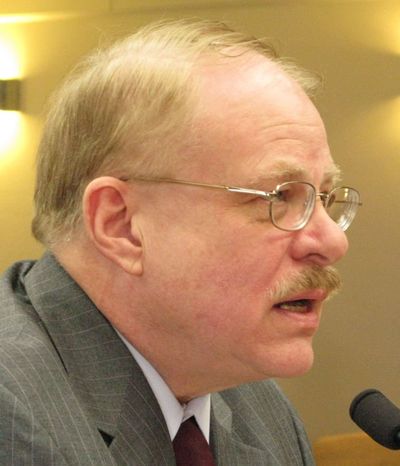EWU facing job losses, official says
Either proposal means cuts, lawmakers told

OLYMPIA – When he took over as acting president of Eastern Washington University, John Mason was given a sign for his office.
“Thou shalt not whine,” it reads.
On Wednesday, Mason mostly stuck to that commandment, even as he described how proposed state budget cuts would affect the school and its students.
“I’ve been telling everyone at Eastern Washington University that there is no part of the university that will not be impacted,” he said.
Under the budget proposed by Gov. Chris Gregoire in December, Eastern estimates that its state funding would drop about $17 million, a reduction of about 14 percent.
Because state revenues have continued to fall below expectations, the Senate has also asked the school to show what it would do in the face of a $25 million, or 20 percent, budget cut.
Trying to write a budget that copes with a budget shortfall of at least $6 billion, lawmakers this week held hearings to find out how officials at each state college would handle deep cuts. No final budget decisions are likely, however, until at least April.
“None of us love the cards we’ve been dealt,” said Sen. Derek Kilmer, D-Gig Harbor. “We have control over how we play them.”
Under either budget scenario, Mason said, “we will see a reduction in jobs. There is no way that will not happen.”
How many? A minimum of 150 to 225, he said. And those figures assume a 7 percent tuition increase this year and next.
Mason said Eastern would try to protect teaching and learning, but fallout is inevitable. The school has vowed to maintain current enrollment under the governor’s plan. But the deeper Senate version would mean 400 fewer students.
To shield instructional programs, the school would focus most of the cuts on research, public service, student services and administration. Under the worst scenario, the budget for research and public service programs would be cut in half.
Mason said no final decisions had been made on how the school’s outreach programs – including an autism center, policy center, and joint programs with local cities, schools and tribes – would be affected.
“All of these activities will be scrutinized,” he said, “and teaching and learning will be our No. 1 priority.”
For now, Mason said, the school has frozen most faculty hiring. All administrators who are also faculty members – including himself – have been ordered to teach a class without extra pay. The school has cut back business education and some foreign language programs, he said.
A big worry, he said, is that cuts will hurt something the school has long prided itself on: a history of making it possible for lower-income students and minorities to go to college.
Nationally, he said, families in the lowest 25 percent of income levels produce only 8 percent of college graduates. “Eastern Washington University works against that pattern,” he said.
Unlike larger research schools, he said, Eastern’s graduates – teachers, social workers, dental technicians, engineers, physical therapists – overwhelmingly stay in Washington. Most stay in Eastern Washington.
One way to create revenue, he said, would be to change Eastern’s fee structure. As things stand now, he said, a student taking 10 credit hours pays the same as someone taking 18 hours. Maybe it’s time to add more tiers, he said.